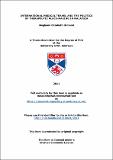Files in this item
International medical travel and the politics of therapeutic place-making in Malaysia
Item metadata
| dc.contributor.advisor | Sothern, Matthew B. | |
| dc.contributor.author | Ormond, Meghann E. | |
| dc.coverage.spatial | 275 | en_US |
| dc.date.accessioned | 2011-03-01T12:33:32Z | |
| dc.date.available | 2011-03-01T12:33:32Z | |
| dc.date.issued | 2011-06-24 | |
| dc.identifier.uri | https://hdl.handle.net/10023/1681 | |
| dc.description | Electronic version excludes material for which permission has not been granted by the rights holder | en_US |
| dc.description.abstract | This thesis examines the shifting relationship between the state and its subjects with regard to responsibility for and entitlement to care. Using Malaysia as a case study the research engages with international medical travel (IMT) as an outcome of the neoliberal retrenchment of the welfare state. I offer a critical reading of postcolonial development strategies that negotiate the benefits and challenges of extending care to non-national subjects. The research draws from relevant media, private-sector and governmental documents and 49 semi-structured, in-depth interviews with IMT proponents and critics representing federal, state and urban governmental authorities, professional associations, civil society, private medical facilities and medical travel agencies in Malaysia’s principal IMT regions (Klang Valley, Penang and Malacca). Across four empirical chapters, the thesis demonstrates how ‘Malaysia’ gets positioned as a destination within a range of imagined geographies of care through a strategic-relational logic of care and hospitality. I argue that this positioning places ‘Malaysian’ subjects and spaces into lucrative global networks in ways that underscore particular narratives of postcolonial hybridity that draw from Malaysia’s ‘developing country’, ‘progressive, moderate Islamic’ and ‘multiethnic’ credentials. In considering the political logics of care-giving, I explore how the extension of care can serve as a place-making technology to re-imagine the state as a provider and protector within a globalising marketplace in which care, increasingly commodified, is tied to the production of new political, social, cultural and economic geographies. | en_US |
| dc.language.iso | en | en_US |
| dc.publisher | University of St Andrews | |
| dc.rights | Creative Commons Attribution-NonCommercial-NoDerivs 3.0 Unported | |
| dc.rights.uri | http://creativecommons.org/licenses/by-nc-nd/3.0/ | |
| dc.subject | Health care privatisation | en_US |
| dc.subject | Medical tourism | en_US |
| dc.subject | International medical travel | en_US |
| dc.subject | Postcolonial development | en_US |
| dc.subject | Politics of hospitality | en_US |
| dc.subject | Malaysia | en_US |
| dc.subject | Place-making | en_US |
| dc.subject | Therapeutic landscapes | en_US |
| dc.subject | Cultural competence | en_US |
| dc.subject.lcc | RA793.5O8 | |
| dc.subject.lcsh | Medical tourism--Malaysia | en_US |
| dc.subject.lcsh | Medical care--Political aspects--Malaysia | en_US |
| dc.subject.lcsh | Privatization--Malaysia | en_US |
| dc.subject.lcsh | Postcolonialism--Malaysia | en_US |
| dc.title | International medical travel and the politics of therapeutic place-making in Malaysia | en_US |
| dc.type | Thesis | en_US |
| dc.type.qualificationlevel | Doctoral | en_US |
| dc.type.qualificationname | PhD Doctor of Philosophy | en_US |
| dc.publisher.institution | The University of St Andrews | en_US |
| dc.publisher.department | School of Geography and Geosciences | en_US |
This item appears in the following Collection(s)
Except where otherwise noted within the work, this item's licence for re-use is described as Creative Commons Attribution-NonCommercial-NoDerivs 3.0 Unported
Items in the St Andrews Research Repository are protected by copyright, with all rights reserved, unless otherwise indicated.


